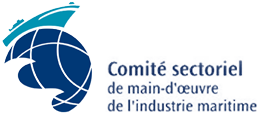Ongoing training in the marine industry
This section presents the training files in which the CSMOIM is involved. One of the CSMOIM's most important mandates is to determine marine training needs. A great many measures designed to adjust training offered to these needs result from an annual survey completed by marine sector businesses.
Maritime industry training requirements survey
A great many measures are carried out in close collaboration with the Centre de formation aux mesures d'urgence de l'Institut maritime du Québec (CFMU) which offers most of the training required by seagoing personnel. Some training is also given by other schools.
For seagoing personnel, there are two main categories of ongoing education : regulatory training and professional development training.
Regulatory training
What is regulatory training?
Training resulting from the application of a regulation that a wroker must have to hold the job which this training is required.
For example, to work as a deckhand on a ship registered in Canada, seafarers must have Marine Emergency Duty II (FUM II) training or get it no later than six months after being hired.
NOTE: Generally, employers require workers to have this training before they are hired.
Professional development training
Courses offered to marine workers and allowing them to obtain a certificate of competency, e.g. Petroleum Products Transportation or a higher officer's licence, e.g. Master mariner.
In addition to offering college-level marine programs in navigation, marine engineering, naval architecture, trasportation logistics and deepsea diving, the Institut maritime du Québec also gives numerous ongoing education courses designed to offer professional development to seagoing personnel. The main school is located in Rimouski, but it has facilities in Lévis, near Québec City, devoted primarily to emergency duty training.
Each year, the Institut maritime du Québec publishes a calendar containing the courses it offers. The calendar is available for consultation
Courses timetable.
Financial assistance
For both types of continuing education (regulatory and professional development), those enrolled may be eligible for financial assistance programs if they meet certain criteria. The CSMOIM is responsible for managing these programs in conjunction with the government departments and schools concerned.
For more information, click here.
Other trainings
Marine training is not restricted to seagoing personnel. Training needs for land personnel are significant - administrative personnel for companies (ship operators, ports, stevedoring companies, etc. ) or workers assigned to handling and operations. For example, in recent years, new safety requirements (protection against terrorist or criminal acts) have resulted in new training needs affecting especially non-navigating personnel.
Career advancement
The career advancement document (bridge and engine room) contains general information on the subject.
Career advancement document - Bridge (French only)
Career advancement document - Engine room (French only)
For more information, please contact Susan Falkner at [email protected].

Follow us